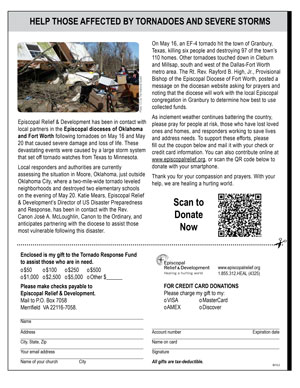Tornado Response 2013

|
Episcopal Relief & Development is currently working with the Episcopal Diocese of Oklahoma to respond to community needs following two clusters of tornadoes — the first on May 19-20 and the second on May 31 — that caused widespread damage and killed 32 people.
- June 24: Local church outreach
- June 1: Second wave of storms
- May 31: ENS article on Oklahoma tornadoes
- May 30: Bulletin inserts in Spanish and English
- May 28: Damage update
- May 22: More details on Oklahoma and Fort Worth tornadoes
- May 21: Tornadoes hit Oklahoma, earlier tornado in Fort Worth
Episcopal Relief & Development is currently working with the Episcopal Diocese of Oklahoma to respond to community needs following two clusters of tornadoes — the first on May 19-20 and the second on May 31 — that caused widespread damage and killed 32 people.
Many churches in the Oklahoma City area have expanded their outreach efforts to meet increased community needs, providing emergency assistance and pastoral care to those impacted. In the immediate term, the diocese is addressing needs for food, shelter and transportation through gas and grocery vouchers, rental assistance and funds for small-scale home repairs such as window replacement. The Church is also serving an important role in reaching out to Spanish-speaking communities, and creating spaces where people can gather informally to talk about their experiences and receive counseling and service referrals.
Members of Episcopal Relief & Development’s Partners in Response team visited Oklahoma during the week of June 16 to assist the diocese with ongoing assessment efforts and accompany local leaders as they plan for long-term recovery. The Rev. Canon José A. McLaughlin, who is currently heading up the Church’s disaster response, has stressed the importance of a coordinated response that exhibits good stewardship of resources, builds on the strengths of local churches and utilizes relationships and connections within the community.
To support disaster preparedness and response efforts in Oklahoma and across the United States, please make a donation to the US Disaster Fund.
Our prayers are with those in Oklahoma who are once again responding to disaster, after a cluster of tornadoes swept through the region on May 31, killing nine people. Moore, Oklahoma — which sustained a direct hit by an EF-5 tornado on May 20 — was among the towns impacted by flash flooding following severe storms that destroyed buildings and knocked out power across four states.
Our prayers are also with those in Iowa who are coping with massive flooding in the Iowa River Valley.
Episcopal Relief & Development continues to work with local partners in Oklahoma, and has reached out to partners in Iowa. To support these efforts, please make a contribution to the US Disaster Fund.
From “Oklahoma tornado clean-up shows ‘miraculous’ outpouring of support“, by Pat McCaughan, ENS, May 31, 2013:
The Rev. Canon José McLoughlin, canon to the ordinary at the Diocese of Oklahoma, said May 30 that the clean-up and recovery efforts are still very much in initial stages and that financial contributions, prayers and other assistance is welcomed.
“A large part of what we are doing is sharing information and continuing to provide resources for short-term needs, for people who need clothes, gift cards, and assistance for housing,” he said.
The American Red Cross and the Federal Emergency Management Agency (FEMA), have established drop-off centers for donations throughout the city as well as coordinating volunteer efforts. He continues to consult with Episcopal Relief & Development and others as the relief and recovery efforts continue to unfold.
“Money is still the best thing to give at this point,” he said. “We are being contacted by people from out of state who want to come in and help, and we’re making sure we coordinate with them … but we have not even had a week yet of clean-up.” He emphasized that the need will continue for a long time, especially once the media spotlight is gone.
“We want to do things smartly and not duplicate efforts and make sure people know they are not being forgotten, both in the short-term and the long-term,” he said.
“We want to be part of the solution, whoever is doing the necessary work of recovery,” he added. “Once people get a better idea of what their insurance companies are going to do we will know better where gaps in services and housing are and we’ll be able to assist with those.”
The Episcopal Church has created Spanish-language bulletin inserts for the Oklahoma tornado response.
Boletín anexo en Español:
Latest numbers from the tornado that hit Moore, Oklahoma on May 20: 24 deaths, including 10 children; 377 injured; $1.5-$2 billion in damage. (AP)
Episcopal Relief & Development has been in further contact with the Rev. Canon José A. McLoughlin, Canon to the Ordinary for the Episcopal Diocese of Oklahoma, who reports: “It is clear that we will need some funding to provide assistance for food, groceries, clothing, etc., in addition to temporary housing. With each passing hour, more and more need is becoming evident.”
The tornado that flattened areas of Moore, Oklahoma – a suburb south of Oklahoma City – was upgraded on May 21 to an EF-5, with winds in excess of 200 miles per hour. The death toll currently remains at 24, including nine children, and more than 230 people were injured. Early estimates put the amount of storm damage in the range of $1 billion.
In an interview with Episcopal News Service published on May 22, McLoughlin stated that the diocese is ‘still very much in assessment and short-term recovery response mode.’ Diocesan staff are cataloging needs and offers of help in order to organize recovery work beyond the immediate phase.
Emergency funding from Episcopal Relief & Development assists dioceses and congregations in reaching out to the most vulnerable members of their communities, supplying food, clothing, temporary housing, pastoral care, case management and support for unmet long-term needs. Necessary repairs to church buildings and related properties are supported by local church-based fundraising efforts.
In the Diocese of Fort Worth, community volunteers are helping to clear debris in the severely hit Granbury neighborhood of Rancho Brazos, as county officials await word from FEMA regarding federal disaster assistance. According to Katie Sherrod, Communications Director for the Episcopal Diocese of Fort Worth, 61 out of the hundred-or-so homes in Rancho Brazos were built by Habitat for Humanity with significant involvement from Episcopal volunteers. All of the Habitat homes were damaged or destroyed by the May 16 tornado, including one recently completed house that was scheduled to be turned over to its new owners on May 17. Episcopal Relief & Development’s US Disaster Program staff and Partners in Response team members have been in touch with the local Diocesan Disaster Coordinator, the Rev. Tracie Middleton, and will be working with the Episcopal church in Granbury to respond.
Episcopal Relief & Development has been in contact with local partners in the Episcopal dioceses of Fort Worth and Oklahoma following tornadoes on May 16 and May 20 that caused severe damage and loss of life. These devastating events were caused by a large storm system that set off tornado alerts from Texas to Minnesota. Weather threats continue, with severe thunderstorm advisories in place from Dallas-Fort Worth to Chicago, and the highest likelihood of tornadoes in the area between Dallas and Little Rock.
At this time, Episcopal Relief & Development encourages prayers for those impacted, and for first responders who are providing immediate assistance. Donations to Episcopal Relief & Development’s Tornado Response Fund will support outreach efforts in affected areas and help meet urgent needs. Because local capacity to receive and house volunteers is currently very limited, interested individuals are requested to sign up via the US Disaster Program’s “Ready to Serve” volunteer database to be contacted down the road when help is needed.
Local responders and authorities are currently assessing the situation in Moore, Oklahoma, just outside Oklahoma City, where a 1.3-mile-wide tornado leveled neighborhoods and destroyed two elementary schools on the evening of May 20. Of the 24 deaths currently confirmed, seven were children at Plaza Towers Elementary School. According to reports, debris and road damage are hampering search and rescue efforts.
The Episcopal Diocese of Oklahoma posted the following message on their website: “Thank you to all who have reached out to us in response to the devastating tornadoes in Oklahoma. We are in the process of assessing the situation and coordinating assistance to our communities.”
Katie Mears, Episcopal Relief & Development’s Director of US Disaster Preparedness and Response, has been in contact with the Rev. Canon José A. McLoughlin, Canon to the Ordinary, and anticipates partnering with the diocese to assist those most vulnerable following this disaster. “We’re prepared to do what we need to do and we’re going to do what we can,” McLoughlin told Episcopal News Service in a story published on May 21.
Earlier, on May 16, an EF-4 tornado hit the town of Granbury, Texas, killing six people and destroying dozens of homes in the neighborhood of Rancho Brazos.* Other tornadoes touched down in Cleburn and Millsap, south and west of the Dallas-Fort Worth metro area. The Rt. Rev. Rayford B. High, Jr., Provisional Bishop of the Episcopal Diocese of Fort Worth, posted a message on the diocesan website asking for prayers and noting that the diocese will work with the local Episcopal congregation in Granbury to determine how best to use collected funds.
“Let us be the hands and feet of Christ,” he wrote, “reaching out to help our sisters and brothers affected by these devastating storms. Please join me as we hold up in prayer those who have suffered bodily injury, loss of home and especially those who have died. And please continue to pray for all the public servants who are there to serve.”
Episcopal Relief & Development’s US Disaster Program offers resources for churches, parents and teachers ministering to children after disasters:
- Working with Children After a Disaster: Tips for Parents and Teachers
- Ministering to Children After a Disaster (Grades K-5)
- Ministering to Youth After a Disaster (Grades 6-8)
- Ministering to Teens After a Disaster (Grades 9-12)
Katie Mears posts tips for advance preparedness and appropriately timed response on Episcopal Relief & Development’s blog, and the US Disaster Program’s preparedness planning guides are available in the online Resource Library.
Contributions to the Tornado Response Fund will assist dioceses responding to recent disasters, and donations to the US Disaster Fund will help sustain vital year-round preparedness and response work. Gifts can be made online at www.episcopalrelief.org, by calling 1.855.312.HEAL (4325) or by mailing a check to Episcopal Relief & Development, PO Box 7058, Merrifield, VA 22116-7058.
Blessed are you, Lord, God of mercy, who through your Son gave us a marvelous example of charity and the great commandment of love for one another. Send down your blessings on these your servants, who so generously devote themselves to helping others. Grant them courage when they are afraid, wisdom when they must make quick decisions, strength when they are weary, and compassion in all their work. When the alarm sounds and they are called to aid both friend and stranger, let them faithfully serve you in their neighbor. We ask this through Christ our Lord. Amen.
— Adapted from the Book of Blessings, #587, by Diana Macalintal
*An earlier version of this post mistakenly referred to the town of Granbury, Texas, rather than to the neighborhood of Rancho Brazos.



